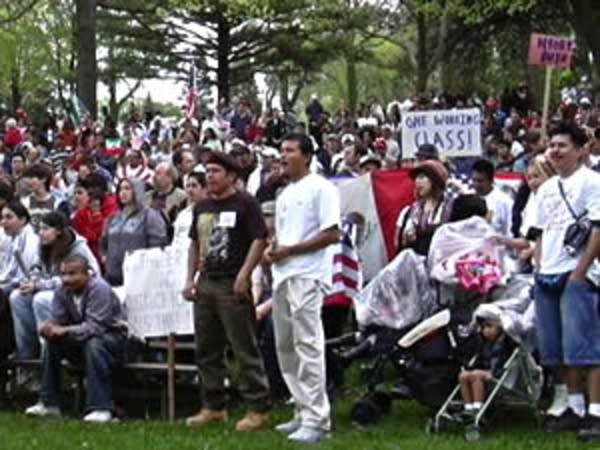Workers, students walk out on `Day Without Immigrants'
Go Deeper.
Create an account or log in to save stories.
Like this?
Thanks for liking this story! We have added it to a list of your favorite stories.

The intersection of Bloomington Ave. and Lake Street in Minneapolis is at the heart of the city's Latino district. Usually it's busy, but on Monday the cars didn't stop because all the shops were closed.
Marco Fernandez Landoni, who works on Lake Street, says he's heard from lots of people who say they closed up shop or stayed away from work.

"We have been receiving calls all day long and people calling us and telling us, 'hey, listen! I'm at home, but I live at East Side St. Paul and I know that all these businesses are closed, and my friends didn't go to work, and the company decided that we deserved this day off.' That's the kind of stuff that we've been receiving," according to Landoni.
Landoni is editor of Latino Communications Network, a Spanish-language media company which owns a radio station, and several print publications, including Gente and La Prensa de Minnesota newspapers.
Turn Up Your Support
MPR News helps you turn down the noise and build shared understanding. Turn up your support for this public resource and keep trusted journalism accessible to all.
He says his company is neutral about the day's events. But he knows his listeners and readers well. He says immigration is their number-one concern. He says they are watching carefully what's going on in Washington D.C. and many are hoping the Day Without Immigrants will influence the debate.

"Most of these people came to this country to work. And that's what they are doing. They pay taxes. They pay Social Security funds. They pay local state and federal taxes and they don't receive any benefit," he says.
Landoni says these immigrants are raising families, making investments in the U.S., but doing it in the shadows.
Estimates of how many undocumented workers in Minnesota range from 60,000 to 85,000 up to 250,000.
Many immigrants work in Minnesota's service industry, mostly restaurants and hotels. A few Twin Cities restaurants closed in response to the day's actions, including the Chipotle Mexican Grill restaurant chain. It closed 16 out of 35 stores in Minnesota.
Tom Day is a vice president for Hospitality Minnesota, a membership organization representing 3,000 restaurants, hotels and resorts in the state. He says the walkout has had minimal impact on his members because employers knew the day was coming and talked about it with their employees.

"If an employee went through the proper process of asking for the day off, they granted it. So there are some managers and assistant managers that are working double shifts today, and willingly let their employees go, and protest peacefully for these types of things," according to Day.
Day says his members support changing immigration laws and are pushing for it, too.
"Immigrants are fundamental to the success of the restaurant industry, as fellow entrepreneurs, as customers, and as workers. So we understand and respect their needs and what they're working for."
The goal of a Day Without Immigrants is to show the economic power of immigrants and undocumented workers.
Steve Hine, a researcher at the state Department of Employment and Economic Development, says immigrants are very active participants in the state's labor market. He suspects the protest will give some impression of their impact, but not the full force.
"The data would suggest clearly that they're an important part of the economy. And while a one-day action of this sort, may have its impact, it would likely understate the true and lasting impact that their absence would suggest," Hine says.
Hine says much of the impact will have been within the immigrant communities, but the attention attracted by the actions is drawing the attention of the larger community.




